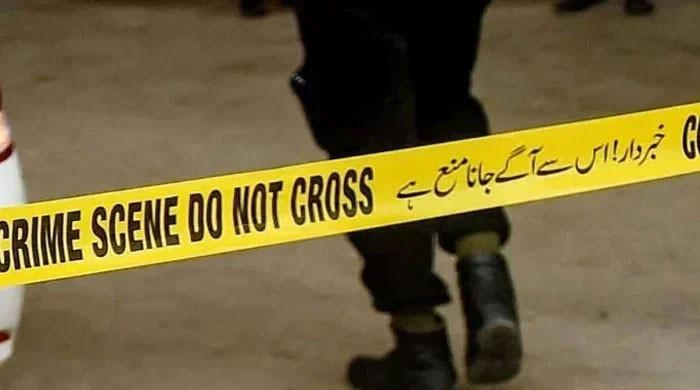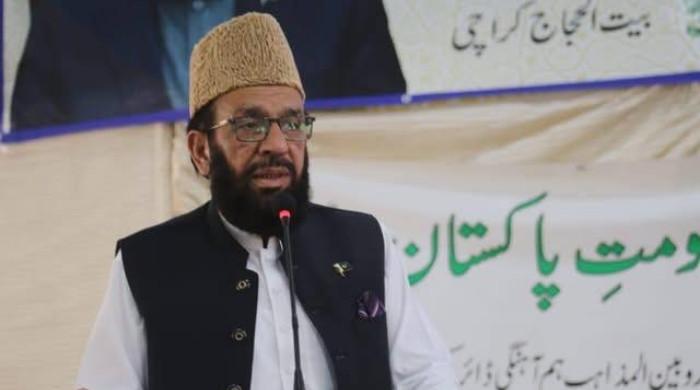What does NRO mean? Revisiting the history of the infamous ordinance
Many young Pakistanis wonder as to what the term NRO actually means. Here is all you need to know about the infamous ordinance
November 02, 2019

LAHORE: We often hear the incumbent Pakistani premier, Imran Khan, asserting vociferously that he would not give any "NRO (National Reconciliation Ordinance)" to the corrupt elements, perhaps making many young Pakistanis wonder as to what the term actually meant.
Just a couple of days ago on November 1, while addressing a gathering in Gilgit-Baltistan, Imran Khan had reiterated for the umpteenth time: "I will not give them an NRO, come hell or high water."
Yes, many young people can gauge through power of Etymology that "NRO" might have something to do with the amnesty or pardon of some guilty elements clutched by the long arm of law for committing unlawful acts.
ALSO READ: PM Imran says will give protesters food supplies but not NRO
A good number of Pakistani youth must have been in school way back in October 2007, yet to attain the age of adolescence, when the term "NRO" had first surfaced on the country's political horizon.
For the convenience and understanding, let us peek into the history and promulgation of the infamous NRO, besides recapping the suspension of this ordinance at the Supreme Court of Pakistan and the subsequent decision of the arbiters of the time to declare it null and void.
History:
Just over 12 years ago, on October 5, 2007, the-then Pakistani President and Army Chief, General Pervez Musharraf, had enforced the National Reconciliation Ordinance, which had granted amnesty to politicians, political workers and bureaucrats who were accused of corruption, money laundering, murders and terrorism etc between January 1, 1986 and October 12, 1999 — the time between two Martial Law stints in Pakistan.
The NRO came into existence just 40 days before the stipulated five-year tenure of the PML-Q was supposed to end.
The NRO was declared unconstitutional by the Supreme Court of Pakistan on December 16, 2009, but not before it had benefited 8,041 allegedly tainted people, including 34 politicians and three ambassadors.
Between 2008 and 2013, or the time when the Asif Zardari-led PPP had held sway in corridors of power, the already-politicised NAB was ordered to closed down the corruption inquiries against almost 60 leaders of the ruling coalition – mostly from the PPP.
Punjab Chief Minister’s Adviser and former Lahore Commissioner Saeed Mehdi was the first reported casualty of the NRO.
The bureaucrat had decided to relinquish charge on November 23, 2009, following the appearance of his name among the beneficiaries of the NRO— whereby setting up a rather honourable precedent.
Chronology of Supreme Court's hearings with reference to NRO:
A tentative glance through the NRO chronology shows that former Chief Justice of Pakistan, Iftikhar Chaudhry, had suspended this ordinance on October 12, 2007, just a week or so after it was promulgated.
Later, it was declared unconstitutional by a 17-member bench of the Supreme Court of Pakistan on December 16, 2009.
But the Chief Justice was soon dismissed after President Musharraf had resorted to abrogate the constitution by proclaiming Emergency in the country on November 3, 2007.
The new Chief Justice, Abdul Hameed Dogar had consequently revived this amnesty order issued by the Presidency on February 27, 2008.
In November 2009, the list of the NRO beneficiaries was first released officially on the orders of the sitting Premier Yousaf Raza Gilani.
This particular list had carried names of 8,401 beneficiaries, most of whom were bureaucrats.
However, at least 34 politicians and three ambassadors were also among the "lucky ones" to get an official pardon for their sins and wrong-doings.
Just to recap events from history, the National Accountability Bureau (NAB) had then asked the Interior Ministry to bar 248 people (including Interior Minister Rehman Malik) from leaving the country.
The days that followed also saw the-then Pakistani Defence Minister Chaudhry Ahmad Mukhtar being stopped at the Islamabad airport from departing the country on a trip to China.
This is what "The News International" had stated in its November 20, 2009 report: "The National Accountability Bureau has presented to the government a list of 248 politicians and bureaucrats, who were alleged to have plundered hundreds of billions of rupees but were cleared by the NAB under the NRO."
The report had added: " Sources in the Law Ministry while sharing with "The News" the "complete list" of NAB’s NRO beneficiaries, explained that thousands other cases of NRO beneficiaries did not belong to the NAB but with the provincial governments because they were criminal cases and were not covered by the NAB law.
On top of the list is the name of President Asif Ali Zardari while his several close associates, both political and bureaucratic, including Rehman Malik, Salman Farooqi and his brother Usman Farooqi, Hussain Haqqani and Siraj Shamsuddin are also reflected."
These names of NRO beneficiaries had included the likes of Yousaf Talpur, Ms Nusrat Bhutto, Jehangir Badr, Ahmad Mukhtar, Malik Mushtaq Awan, PML-N MNA Rana Nazir Ahmed, ex-MPA Mian M Rashid, ex-MPA Tariq Anees, ex-MPA Mian Tariq Mehmood Dina, Agha Sirajuddin, Aftab Ahmed Sherpao, ex-provincial minister Ghani-ur-Rehman, ex-senator Haji Gulsher, ex-provincial minister Habibullah Khan Kundi, ex-MNA Mir Baz Khan Khethran, Anwar Saifullah Khan, ex-provincial minister Sardar Mansoor Laghari, ex-Mayor Sargodha Ch Abdul Hameed, ex-chairman Zila Council Lahore Ch Shoukat Ali, ex-MNA Haji Kabir, and ex-chairman Zila Council Lahore Chaudhry Zulfikar Ali.
It also inculded Rehman Malik, ex-secretary information and presently Pakistan’s former ambassador to the US, Husain Haqqani, ex-federal secretary and former principal secretary to the President Suleman Farooqi, former principal secretary to the PM Gilani Siraj Shamsuddin, ex-NBP president M B Abbasi, ex-secretary Sindh Rasool Baksh Rahoo, ex-DG textile quota Nayyar Bari, ex- secretary commerce Brig (R) Aslam Hayat Qureshi, ex-advisor to Prime Minister A R Siddiqi, ex-principal secretary to the PM Saeed Mehdi, ex-principal secretary to the PM Ahmed Sadiq, ex-chief secretary Punjab Javed Qureshi, ex-DG Intelligence Bureau Brig Imtiaz, ex-MD Printing Corporation of Pakistan Pir Mukarram Shah, ex-secretary Petroleum Capt (R) Naseer Ahmad, ex-FIA Assistant Director Sajjad Haider, ex-Deputy Director FIA Ch Muhammad Sharif, ex-Additional Commissioner Income Tax, Javed Iqbal Mirza, ex-Managing Director Karachi Water and Sewerage Board Aftab Ahmed, ex-Regional Commissioner of Income Tax Sindh Abrar Ahmed, ex-Secretary Javed Burki, former DG Port Qasim Authority Irshad Ahmed Sheikh, ex-DG Peshawar Development Authority Syed Zahir Shah and ex-SP Railways Inamur Rehman Sehri etc.











